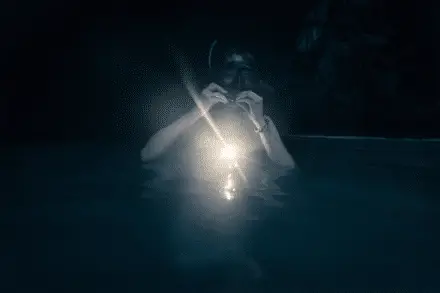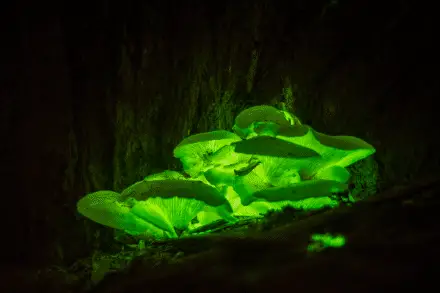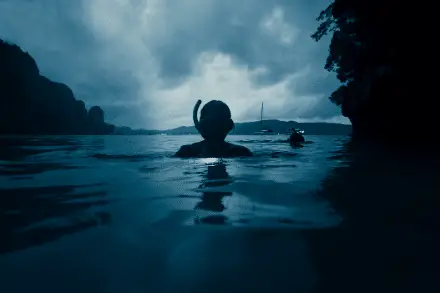Most people think of snorkeling as a daytime activity, but there is no rule that says you can’t do it at night. Many experienced snorkelers add to the thrill of the activity and start snorkeling at night. Some people even prefer it to daytime snorkeling. Marine wildlife surrounded by bioluminescence makes for a magical experience, and you don’t have to worry about sunburn if you snorkel at night. This article will aim to explore all the benefits of nighttime snorkeling and give you tips on how to do it if you are inclined to do so.
Benefits Of Snorkeling At Night

Swimming in the open ocean during the night may seem intimidating for many people, and rightly so. However, there must be something that lures people into partaking in this activity at night. These are some of the reasons we could think of.
A Different Experience
Even for experienced snorkelers, it is an entirely different adventure to snorkel at night. Most will tell you they were surprised by the magical feeling they had after their first time. The corals are more beautiful when they are not flooded with sunlight, and you can expect the waters to be calmer. In fact, many of the things you would see at night aren’t there during the day.
Many people like to meditate underwater, and although it is more common in freediving, using a snorkel can make it easier for people to participate in underwater meditation. Being submerged in the dark, quiet ocean can have an intensely calming effect on some people.
Aquatic Life And Bioluminescence
Even if you’ve seen marine life out and about in the sunlight, some of them are more active at night. Examples include octopuses, crustaceans, and eels. You may have already heard that deep-sea divers get to see glowing fish, and nighttime snorkeling might give you a similar experience with bioluminescent plankton. These are tiny organisms in the water that give it a glow that can only be seen when pitch black.
Stunning Photography
Many of us love snorkeling for the amazing photos we take of our exploration underwater. The photos are of a completely different esthetic when taken at night. Also, photos of nocturnal marine life are only possible when they come out after dark, which adds to the experience.
What Is Bioluminescence?

Some animals, fish, and other living creatures can emit or show glowing light by their bodies’ chemical reactions. This is not a reflection of an external life (like the luster of pearls). Instead, it is light being created. In the sea, this is observed in deep-sea creatures and surface plankton as well.
Snorkeling at Night Tips
If you’re already thinking of planning your next snorkeling trip for the nighttime, we don’t blame you. After all, it is an interesting and unmatched experience. These are our important tips you should know before you go snorkeling after dark.
Special Equipment
You will need the same snorkeling equipment that you usually use for your normal daytime snorkeling session. This is a quick list of common snorkeling equipment:
- Snorkel
- Diving mask or Goggles (depending on Snorkel type)
- Swim fins
- Optional: weight belt
- Optional: snorkeling vest (inflatable)
Wet Suit
Any snorkeling you will do at night will invariably be at lower temperatures than the same dive spot in the daytime. So, it is important that you put on a neoprene wetsuit to stay comfortably warm while you’re in the cold water. The material traps air bubbles within it, insulating the body from the colder temperature surrounding it. If you already go scuba diving, you may use the same suit; there is nothing different about snorkeling in this regard. Additionally, some suits may give a little buoyancy which can be helpful for some people.
If you don’t want to go through the trouble of getting a whole wetsuit, you may choose to wear a neoprene top. Some people also add neoprene socks and gloves as well, but those are optional.
Dive Light
Without the light from the sun, it will be pitch black underwater. That is why you will need a waterproof flashlight or dive light to help you explore. Some dive shops rent these out, but they aren’t that expensive to buy. Weigh out your option, but you will need to have a light source to enjoy your snorkeling session and for safety purposes as well.
Optional: Camera
If you are fond of taking photos and videos of your underwater exploration, you will need a special camera. Not only will the camera need to be waterproof and fit for the depths you want to swim at, but it must also be equipped to take clear photos at night. Most cameras these days allow you to change the exposure setting, play around with the settings to get the perfect light and avoid blurry and dark photos. Generally, this means increasing the ISO setting on your camera.
Safety Precautions
The ocean at night is very different from the daytime ocean. Besides the usual precautions that you need when out in open waters, here are a few safety tips you should know if you’re out snorkeling at night.
Reduced Visibility
Always keep in mind that at night we all have reduced visibility. So you should take it slow when swimming, even if you have a dive light. It will only illuminate a small part of the area ahead, so don’t wander off too far.
Buddy System
Never go snorkeling at night (or swimming) without a friend or guide. Not only will they be able to help you take photos and videos, but it is also much safer for both of you when you are together. If you are in a group, never wander far from the group alone. In other words, use the buddy system. This ensures your safety in case of injury, blackouts, or even if you get lost.
You should always only snorkel with experienced swimmers if you are without a guide. Inexperienced swimmers pose a risk to themselves and you, and the risks are all elevated with reduced visibility at night.
Whistle And Other Communication
The buddy system only works if you have good communication. Stay close to your friends because communicating at a distance can be difficult. Also, carry a whistle with you (usually tied to a limb or your neck) to help alert others if you are too far away. In case of emergencies, the whistle can be a lifesaver.
Ideally, someone on shore should know you are in the water. This is so they can check up on you if you’ve stayed longer than intended. Having a whistle helps in this sense because if someone from the coast guard is searching for you, it is easier to alert them of your location. Some people also carry glow sticks with them to improve the chances of others seeing them.
Life Vests
Especially if you are an inexperienced swimmer, you should wear a high-quality snorkeling life vest. Some of them have the option of staying deflated, and in case of emergency, they can be inflated using carbon dioxide discs. Do not skimp on this important safety attire. Really well-designed life vests keep your face up even if you blackout. Poorly-made live vests will only make you float – if you are blacked out with your face in the water, there is a real possibility of drowning (even though you’re floating).
Predators
Some marine animals tend to hunt at night, but you should not be too worried about them. They are unlikely to attack humans. However, it is important not to provoke any marine life. In other words, respect the ocean and its inhabitants, and know your place on the food chain.
Additional Tips
These are some additional tips we thought are worth mentioning.
- Your first time snorkeling at night should be with a guide, both for safety reasons and so you can enjoy it better. Guides usually know the best spots on the shore (or in the water) to see marine creatures, and they will show you a lot more than you could find yourself because they are practically in those waters every day.
- Try not to snorkel in a new spot at night. Ideally, it should be an area you (or your guide) are already familiar with. At the very least, you should explore the area in the daytime first and come back a few days later to explore it at night. This is just to be sure it is safe to snorkel in the area.
- Turn off your dive light if you feel safe in the water, and you might see luminous sea plankton in the waves. They may even be all over your body. The view of glowing waves under the moonlight is extraordinarily fascinating.
- Respect the ocean wildlife, and do not touch anything unless a guide tells you it’s okay. There are many stinging jellyfish in the water and other potential dangers. It is not enough to put you off the trip, but you should be careful in the water as always.
- Have a pre-set plan in place. You should not have any surprises in the water. Remember to check the weather forecasts ahead of time as well. Take into account the tides, just as a fisherman or sailor would before going out to sea. If this information is too difficult for you, ask someone more experienced. The ideal weather for nighttime snorkeling should be clear, and if you can plan it on a full moon, you’ll enjoy its silver shine on the water.
- Part of planning means performing thorough snorkel set checks on anything you will be using in your snorkeling session.
Our Favorite Night Snorkeling Locations

We suspect many of you have already decided you want to try nighttime snorkeling, so we compiled a small list of our favorite locations for you.
Kona, Hawaii
This is already a well-known location for scuba diving, freediving, snorkeling, and many other water sports. There are several dive shops with experienced divers and snorkelers so you can feel safe diving at night. Off the coast of Kona is an area is known as Manta heaven, where many manta rays are swimming around at night, so ask for them specifically. You will be pleased to see them feeding on luminous plankton. It’s safe to say there’s nothing like it! If you’re already heading to Kona for any of their exciting tourist activities, this should be on your list of things to do as well.
Florida Keys
You can get a tan all day, enjoy some Key-lime pie, and then go snorkeling at night in the Florida Keys. However, it may be a little pricey because you will need to rent a boat and get further into the ocean to see more creatures and other great finds. If you stay close to the shore, all you’ll get to see are some jellyfish and very minimal corals. You’re already going out of your way to snorkel in the dark, so you should make it count.
St. Thomas (US Virgin Islands)
There are guided tours in St. Thomas, but it is seasonal. It’s a great option for beginners because the guides are experienced, and the groups are small. The luminous plankton comes and goes, and with it are the tours. However, it is worth the trip to see those glowing waves.
Final Thoughts
With the right precautions, snorkeling at night can be an intense, fascinating experience unlike any other. To get the most excitement out of your trip, try to plan it around timing where you will be able to see bioluminescence in the water. You will be disappointed if you go out of your wait to snorkel at night and never witness the beautiful phenomenon.
Snorkeling is exciting, and doing it at night is worth a try. So give it a shot, but remember to keep your safety a priority and exercise all the proper safety measures. Thorough planning and precautions will not keep you from enjoying the awesome underwater midnight views.
